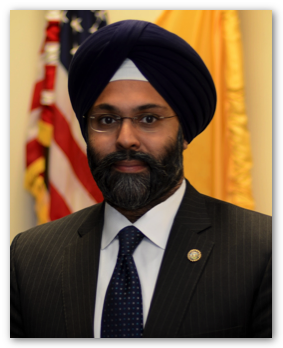Joint Statement of New Jersey Law Enforcement Leaders

Joint Statement of New Jersey Law Enforcement Leaders
Issued by Attorney General Gurbir S. Grewal, the Department of Law & Public Safety, New Jersey State Police, County Prosecutors Association of New Jersey, New Jersey State Policemen’s Benevolent Association, New Jersey Fraternal Order of Police, State Troopers Superior Officers Association, State Troopers Non- Commissioned Officers Association, and State Troopers Fraternal Association.
Every day, New Jersey’s 36,000 law enforcement officers put their lives on the line to ensure the safety and wellbeing of our fellow residents. They do extraordinary work—often under challenging circumstances and often without the recognition they deserve.
Our police officers interact with the public millions of times each year, with interactions ranging from routine traffic stops to active shooters. In the overwhelming majority of cases, these officers handle the matter professionally and the interaction ends without incident.
From time to time, officers are confronted with situations where they have little choice but to use force against an individual who is not complying with a lawful order or who poses an immediate threat to themselves or others. Oftentimes, this use of force is a necessary and appropriate response to a dangerous situation.
Unfortunately, there may be a rare occasion where an officer uses violent force against a civilian without justification. We condemn such actions, not simply because such actions are wrong, but also because they do a disservice to the vast majority of law enforcement officers committed to upholding the highest standards of the profession.
For years, the State of New Jersey has required that law enforcement agencies collect and report data about the use of force by their officers. We recognize that use-of-force data – when properly collected – serves many useful purposes, from identifying policing trends to building public confidence in law enforcement.
But numbers rarely tell the full story, and data can be easily misused to advance false narratives that malign our profession. The risks are especially great when the data is collected, reported, or analyzed without uniform standards. Therefore, it is crucial not simply that we obtain accurate data, but also that we provide the context necessary to understand and explain this information to the public.
Last week, the Star-Ledger began publishing a series of articles about the gaps in the uniformity of our state’s use-of-force data collection efforts, as well as the newspaper’s effort to build a use-of-force database of its own. The articles make one thing clear: although individual municipalities, departments, or counties may have effective systems in place, our statewide data collection system requires a complete overhaul.
But it is for this very reason that we also caution reporters and members of the public about relying on data in the Star-Ledger’s database: because our state lacks uniform data collection methods, the records obtained by the Star-Ledger may be inaccurate in some cases and may cause those relying on the data to draw incorrect conclusions about the state of law enforcement in New Jersey.
We are committed to fixing this problem. It falls to those of us in law enforcement to improve our data collection efforts and ensure that any data we provide the public is both accurate and properly contextualized.
Today, we are announcing a joint effort to address the issue. Under the leadership of the Office of the Attorney General, we will be working together to design a new system for obtaining use-of-force data in New Jersey. We intend to:
(1) Standardize the process that state, county, and local law enforcement agencies use to record use-of-force incidents and report them to the State, including through the use of standardized electronic forms;
(2) Identify ways to contextualize use-of-force incidents with accurate information about the officers’ actions; and
(3) Identify one or more academic institutions to partner with the State of New Jersey to help analyze use-of-force data and ensure the rigor of the state’s data collection efforts.
We intend to work quickly to develop new tools, with the goal of completing our work sometime in the new year. We cannot do our jobs without the confidence of the people we serve, and we are committed to ensuring that the public understands when and under what circumstances New Jersey’s law enforcement officers use force during the course of their public duties.
Issued on behalf of:
Department of Law & Public Safety
Gurbir S. Grewal, Attorney General
Veronica Allende, Director, Division of Criminal Justice
Thomas Eicher, Director, Office of Public Integrity & Accountability
Christina Glogoff, Director, Office of Law Enforcement Professional Standards
New Jersey State Police
Col. Patrick J. Callahan, Acting Superintendent
County Prosecutors Association of New Jersey
Francis A. Koch, President
New Jersey State Association of Chiefs of Police
Chief Richard Buzby, President
New Jersey State Policemen’s Benevolent Association
Patrick Colligan, President
New Jersey Fraternal Order of Police
Robert W. Fox, President
State Troopers Superior Officers Association
Rich Roberts, President
State Troopers Non-Commissioned Officers Association
Pete J Stilianessis, President
State Troopers Fraternal Association
Steven Kuhn, First Vice President





